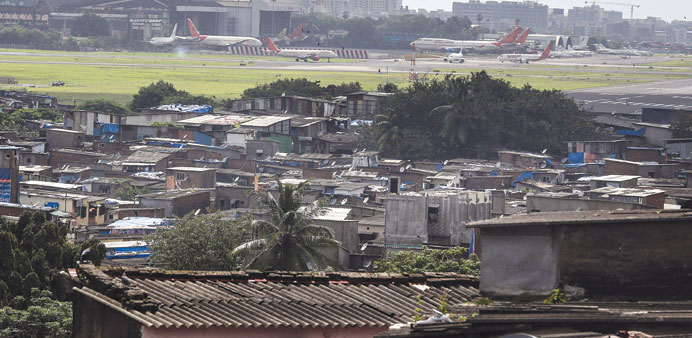A general view of the airport and surrounding slum area in Mumbai, India, 12 September 2014. According to reports civil aviation authorities have asked municipal authorities in Mumbai to relocate the slums dwellers living around the airport. EPA/DIVYAKANT SOLANKI
Agencies/Mumbai
The federal government has asked officials in Mumbai for a plan to evict 90,000 slum-dwellers living around the airport after terrorist attacks on airfields in Pakistan, a person familiar with the proposal said.
The civil aviation minister has written to the Maharashtra government asking it to relocate and rehouse those living by the airport, according to an aviation ministry official, who asked not to be identified as the information isn’t public. The security threat to the Chhatrapati Shivaji International Airport from the slum is grave, the official said.
Prime Minister Narendra Modi’s government is looking at terror threats to aviation more closely after the Taliban attacked Karachi’s airport in early June killing 36 people and later that month gunmen fired on a plane coming to land in Peshawar, killing one passenger.
Evicting slum-dwellers in India’s financial capital has always been contentious, however, and past efforts at the airport have had little success.
“There will always be resistance, and relocation, if it happens, won’t be quick either,” Uday Athavankar, a professor at the Industrial Design Centre at the Indian Institute of Technology in Mumbai, said. “To move people is never easy when they have built their community in that area.”
The slums occupy about 309 acres of land around the airport and have restricted the expansion of the facility.
The Indian government has identified 150 acres of land near the airport, where 15-story buildings will be built, the person said. GVK Power & Infrastructure Ltd (GVKP), which controls the airport, will be asked to construct the buildings to house the slum-dwellers, the person said.
Local political considerations are a factor that will tend to slow slum clearance, said Burzine Waghmar, who is on the academic staff of the South Asia Institute at the School of Oriental and African Studies in London.
“There are vested interests,” he said. “Politicians count on these people as a vote bank, so they won’t allow anything to happen to them.”
Taliban fighters killed 36 people at Karachi’s international airport in June and warned foreign investors, airlines and multinational companies to stop operating in Pakistan. A month later, Malaysia Airlines (MAS) Flight MH17 crashed in eastern Ukraine after being possibly hit by a missile, underlining threats to aviation safety around the world.
Al Qaeda said last week it plans to conduct operations in India as well as work to end what leader Ayman al-Zawahiri called the suffering of Muslims throughout South Asia, including Kashmir, Myanmar and Bangladesh.
Security has been tightened across Indian airports after Al Qaeda’s announcement, the person said. Indian officials held a meeting after the attack in Pakistan to review the security situation in airports, the person said.
GVK and its partners took over running the Mumbai airport in 2006 as part of government plans to modernise India’s transportation networks. The company demolished about 100 buildings, including a police station, to construct a new passenger terminal that cost about Rs55bn ($904mn) and opened earlier this year.
Years of efforts to clear the tin-roofed shanties that surround the Mumbai airfield hit a road block last year when a company tasked with the job had its project terminated, prompting a court battle. A 17-year-old plan to build a second airport in the city has gone nowhere.
The city itself is home to some 6.5mn slum-dwellers, or more than half its population, according to the Slum Rehabilitation Authority. They live without running water, private toilets and basic sanitation.
Air traffic to Mumbai, India’s busiest airport after New Delhi, will more than triple to 100mn passengers a year by 2030, according to estimates by the Maharashtra government. Unless the airport can expand using the land where slums exist now, the airport will become saturated in “very near future,” Civil Aviation Minister Ashok Gajapathi Raju wrote in a July letter to the Maharashtra government.

